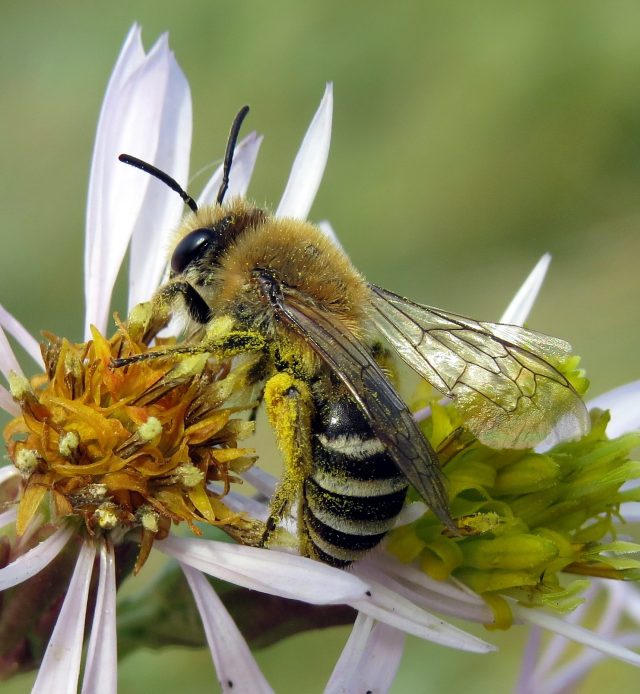What are neonicotinoids?
Frequently used as a seed treatment, neonics are used on many different crops. The chemicals remain in the plants, travelling into the nectar and pollen where they are consumed by bees and other wild pollinators such as hoverflies and moths. Before a pesticide is first approved, tests are undertaken to look at whether the chemical will kill the organism outright. These tests are performed on honeybees, and only a few other species of invertebrates.
Neonics are related to Nicotine, and target the nervous system; this means that invertebrates can be affected in different ways. Even small doses may lead to ‘sub-lethal effects’ such as making a bee not able to forage for food properly, or queen bees laying fewer eggs. The original tests were never designed to look at these effects.
Evidence that neonicotinoids are harmful to wildlife has been growing in leaps and bounds. Independently published data consistently shows that these toxic insecticides, not only affect bees and other pollinators, but even vertebrates such as birds. A four-year report analysed over 800 papers and concluded that there was “Clear evidence of harm sufficient to trigger regulatory action”.
The European ban
In December 2013, a new piece of legislation put forward by the European Commission came into effect in the European Union, restricting the use of neonicotinoid insecticides (neonics) – Clothianidin, Imidacloprid and Thiamethoxam. Earlier in the year, a report by the European Food Safety Authority identified that there was a high risk to honeybees from these common neonicotinoids which were used on 1.2 million hectares of the British countryside.
The ban is intended for crops which are ‘attractive to bees’, such as oilseed rape and maize, and will restrict sowing seeds into the ground during the summer to avoid poisoning from dust clouds. The ban will be reviewed within two years.
This change in legislation is a step in the right direction, although not a complete solution, to saving pollinators from these toxic insecticides.
A number of countries including the UK voted against the ban, calling it a ‘knee jerk reaction’, and that farmers will lose one of their most valuable crop protection tools. This is a far cry from Defra’s promise that “We take any threat to bees very seriously”; a statement on their website as a response to the large number of new scientific studies which show that neonics are impacting badly on pollinators.
Thankfully, enough Member States voted in favour of it, for the European Union to push it through at the appeals process. Now around half of the UK’s agricultural land which had previously been treated with neonicotinoids, will be free of these bee-killing insecticides.
Although this sounds like good news, in reality, a two year suspension is not enough to see our bee populations recover. Neonicotinoids have a half-life (the time taken for half of the chemical to disappear) in soil of over three years, and will still be used on winter crops. The ban focuses on pollinating insects such as bees and has addressed those issues, but neonicotinoids have harmful effects on soil and aquatic invertebrates which haven’t been touched on.
The European Commission also now needs to asses the risks from the remaining two neonics, acetamiprid and thiacloprid. Although these chemicals are relatively less potent than the other three, their toxicity can be increased by up to 560 times when combined with other chemicals such as certain fungicides. Acetamiprid and thiacloprid are used less frequently on crops, but we are concerned that they will be used to replace the main three once the ban in force, removing any benefits that the ban would have. The next step is to put a monitoring programme in place which will assess how all pollinators, not just honeybees, are doing as a result of the ban.
You can find out the latest news by visiting our news page.
What can you do?
Lots of things!
- Make your garden insect-friendly. To find out how, visit our gardening for insects page.
- Avoid using pesticides in your garden, and give bees a safe place to live in.
- Join Buglife today and help us in our campaign against these deadly chemicals. Click here to join.
- Tell your friends, family, teachers, postman etc about these toxic chemicals.
Pollinator declines
Honeybee decline is a global and well documented issue and wild pollinators are decreasing at an alarming rate. The scientific evidence pointing towards neonics is on the rise. Current data shows that roughly two-thirds of the species of pollinator such as bumblebees, hoverflies and moths are declining. Over 250 pollinators are threatened with extinction and the value of pollinators in the UK has been estimated to be around £510 million per year to the UK.
Without these insects, farmers would have to hand pollinate crops themselves at a cost of £1.8 billion a year, similar to the situation in Schezuan, China, where pesticides use has decimated insect populations.
Buglife and neonicotinoids
Buglife have been lobbying the Government since 2009, when we published a report, ‘The Impact of neonicotinoid insecticides on bumblebees, Honey bees and other non-target invertebrates‘, looking at the effects of neonicotinoids on invertebrates. Even four years ago, science showed that there was an effect on wildlife from neonicotinoids but the Government refused to act.


